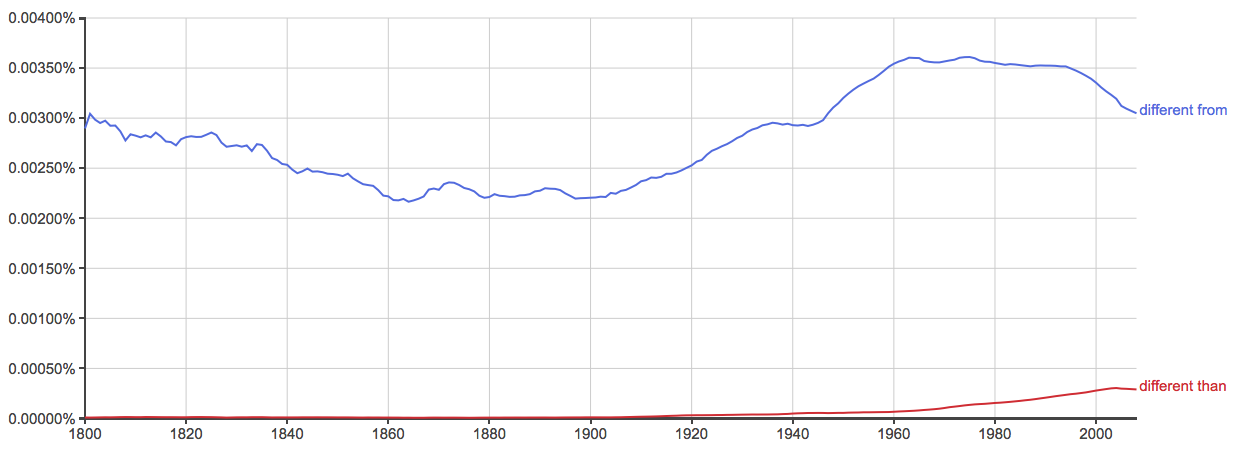There are many ways to discuss the similarities and differences between ideas. One of the simplest ways to explore two things side-by-side in a sentence is to employ a phrase like different from or different than.
Each of these phrases is acceptable, but in some cases one or the other is a better choice. This guide will help you decide which expression you should choose.
What is the Difference Between Different From and Different Than?
In this post, I will compare different from vs. different than. I will give example sentences for each of these phrases, so you can see them in context.
I will also show you a memory trick that will help you decide whether to use different than or different from when drawing distinctions.
When to Use Different From
 What does different from mean? Different from is an adjective phrase that is used to contrast two things.
What does different from mean? Different from is an adjective phrase that is used to contrast two things.
For example,
- The basketball player’s defensive approach was different from that of his opponent.
- In some ways, macaroni is no different from any other noodle.
- My friend’s fishing pole isn’t that different from mine, but he catches more fish than me.
- Numerai is different from similar funds because its contributors remain anonymous and prove themselves through weekly “tournaments” held by the fund manager. –The New York Times
When to Use Different Than
 What does different than mean? Different than is another adjective phrase that is sometimes used to contrast two things. The phrase is often divided.
What does different than mean? Different than is another adjective phrase that is sometimes used to contrast two things. The phrase is often divided.
For example,
- Deann realized that her answer was different than Jennifer’s answer.
- Judy took a different route than Karla did.
Different than is often considered inferior to different from because, logically speaking, than should follow a comparative adjective.
For example,
- He is larger than you.
- She is smaller than you.
- He is smarter than you.
Different is not comparative in this sense. While it certainly is a word of contrast, it is not a comparative adjective.
For this reason, writers should generally prefer different from, barring some other reason (outlined below).
Different Than or Different From? When to Use Each
In general, different from is preferred over different than. Some editors consider different than incorrect in all contexts, so in academic or professional writing, it would be wise to choose different from.
However, not everyone considers different than problematic. In some cases, it is less wordy to use this version, especially when clarity is improved by separating the two words.
Consider one of the example sentences from above,
- Judy took a different route than Karla did.
In order to use different from, you would need to significantly rephrase the sentence, perhaps like this,
- Judy took a different route from the one that Karla took.
The two sentences convey the same information, but the first is shorter and simpler. All else being equal, you should strive for concision and clarity in your writing, so different than is useful in many situations.
Still, different from is more than 11 times as common as different than (see graph below).

This chart graphs different than vs. different from in English books over the past 200 years, and you can see that there is a clear preference for the form different from.
Generally speaking, different from is a better choice when from and than work equally well.
In this example sentence, for instance, either word can substitute for the other,
- Deann realized that her answer was different than Jennifer’s answer.
- Deann realized that her answer was different from Jennifer’s answer.
In cases like these, you would do well to choose different from. Since from is spelled with an F, like formal, you can remember to choose it for formal writing.
Summary
Is it different from or different than? Different from and different than are adjective phrases that are used to contrast two or more things.
While different from is preferred in most formal writing situations, different than is useful in certain contexts, though it is less common.
Since from and the word formal each start with the letter F, it should be an easy task to stick with different from in formal writing situations.
In summary,
- Writers should generally prefer different from.
- Different than, however, does have some useful purposes.
- In formal writing, always opt for different from.
Contents
